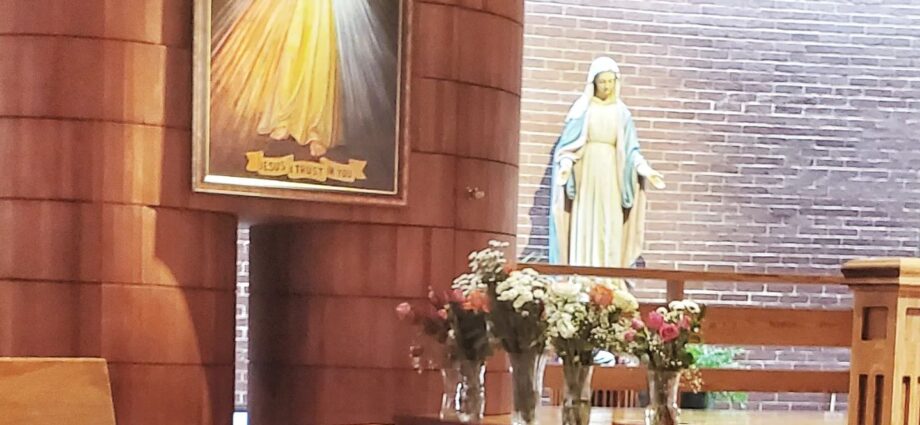I’ve always had problems with my ears. During the spring of every year, I usually begin to lose my hearing as the plants begin to bloom. My allergies cause them to close off, especially on my right side. I begin to say “huh” or “what” so much that it becomes apparent to those close to me that I have trouble hearing. Then, after a while and lots of allergy medicine, I hear a popping cracking sound, and my hearing rushes back to me. They clear out almost instantly. At that moment, one of the most amazing things happens. I can hear the wind. The air is moving around me. Indoors or out, there is this rush of air moving that generally, we are so accustomed to that we don’t even realize it’s there anymore.
Today as I knelt at the altar, peering up as the priest said the words of consecration, my ears popped, and the wind began to move. It was such an apropos reminder of God’s presence, especially after having heard the words of the first reading describing the event of Pentecost. That moment when a “driving” wind filled the room, that upper room where Mary and the Apostles were waiting for God in prayer and anticipation. Sometimes we get so used to the Mass that we can be kind of like that about what is going on right in front of us. We have heard these words so many times and seen these actions that even though we are aware of a miraculous, mysterious event happening right before our eyes, we aren’t as amazed as we should be.
That same spirit that descended upon those disciples in the upper room, that same tongues of fire, wash over us like the ocean at high tide every time the word of God is proclaimed at Mass. Too many people want to separate Scripture from the Mass as if it is just a book to be studied, but it’s a word that animates us precisely when we understand that it is a part of our worship. We use the word “verbum” to describe it in Latin. It is a living word, a verb, an action, the breath of God being sent out into the room on the wings of the Holy Spirit to come to rest in the hearts of those willing to allow Him to live inside of them. When we try to read it like a book, we miss the intent of the compilation of the Bible in the first place. It was meant to be read, pronounced, and make a difference in the hearts of those who listen.
We can’t allow our hearts to become hardened to that proclamation of the living word of God in the context of worship as we gather together to listen for and wait for the presence of the Holy Spirit to animate us into action. Our hearts should be burning with that fire of desire, that burst of infinite energy as the word comes to us in the Liturgy of the Word and the Liturgy of the Eucharist. We Catholics don’t just study Scripture; we pray it. We cherish it. We allow it to become part of our heartbeat as our lives begin to ebb and flow with the rhythms of the Church, the prayers of its liturgies, and the cycle of the liturgical year. That’s the only way to understand Sacred Scripture. It’s precisely how the first Christians understood and recorded its use in the book of Acts. It’s how we see the Mass described as early as the year 155, almost identical to how we worship and use Scripture today.
The scriptures are liturgical books. They can only be adequately understood in the context of that same early Church’s religious mindset and beliefs and should never be separated from the Church. That is just one of the many reasons I became a Catholic, and it’s why Cardinal Newman once said, “To be deep in history is to cease to be Protestant.” You’ll be amazed once you begin to study them from a Sacramental point of view how many things begin to fall into place and how many difficult passages suddenly begin to make sense. Study on my friends, but study how the Church intended it to be studied when they canonized the books to be used in their worship services.
A reflection on the readings for Pentecost Sunday: June 5th, 2022

